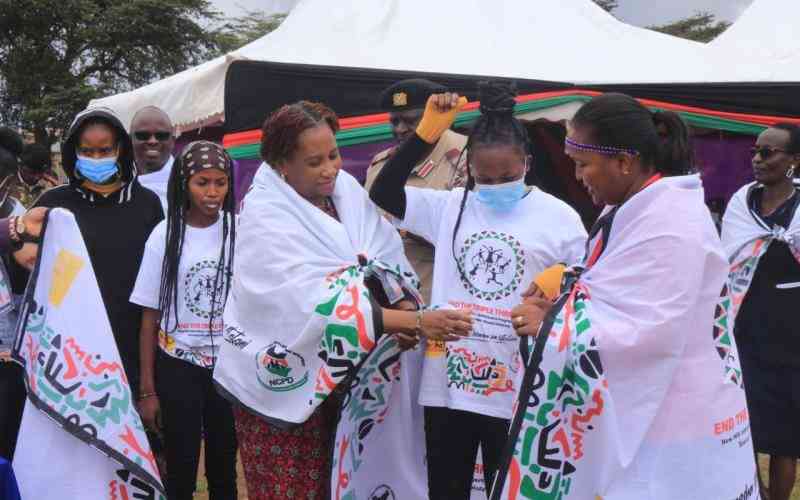
The government's move to boost community health services and equip the providers with basic testing kits has been applauded.
Health stakeholders say the measure would revamp healthcare and decongest hospitals.
"No other time in Kenya have we had community health services lifted as it is now, politically and financially," Amref Health Africa CEO Githinji Gitahi posted on LinkedIn.
In the Kenya Kwanza health manifesto, President William Ruto promised to bank on preventive care in managing health.
Health Cabinet Secretary Susan Nakhumicha reaffirmed that the ministry is developing primary health networks to have a clear referral system.
The Community Health Promoters, she said, will handle patients at households, and refer them to Level 2 hospitals, where they are likely to be referred to Level 3, 4 and 5 as per the need of care.
Head of Community Health Programme in the Ministry of Health Maureen Kimani said although recently flagged off by the president, promoters have been operating within the health system since 2006, and were previously known as community health volunteers.
- UHC workers threaten strike, demand permanent terms and gratuity
- Raila's devolution vision that shaped healthcare agenda
- Peer review begins amid push for UHC and nuclear programme
- Nairobi hosts World Health Expo, focusing on Africa's Health Future
Keep Reading
The health workers operate within legal structures established under Health Act 2017, which recognises community health as level 1 of the health system.
Dr Kimani said that in the past, they would educate community members on safe drinking water, availability of toilets and handwashing facilities made of locally available materials. They would also report any events in the villages such as cases of diarrhoea, cholera and malaria.
"Community health approach was one way of helping reverse the trend in worsening health indicators like maternal and child deaths, and reducing burden of diseases, more so communicable diseases," said Kimani.
With their recognition, counties are expected to adopt the structures and fund the programme, whereas the national level provides training and supervisory role.
Training package
During recruitment, the county maps out areas where there are gaps and engages the community members to select one of them who can be trained based on the ministry training package for community health promoters, and allocates households to them.
"Recruitment of community health promoters is done at community level, where individuals could volunteer, or be selected by individuals from the same village, an exercise which falls under the mandate of the county government," she explained.
The initial training takes about 10 days, and for a further three months to cover the entire training package, which is prioritised based on the disease burden of each county. For example, promoters in malaria pandemic zones are taught basics of malaria and prevention. Those in places like Nyeri are mostly equipped with basics in non-communicable diseases such as diabetes and hypertension.
Other segments include sensitising individuals on safe environment, clean cooking, importance of toilet use and consumption of safe water and handwashing.
After the training, they are closely supervised by the community health assistant, and linked to a dispensary or a health centre, where they can get ongoing support and resupply of basic health commodities.
"A trained community health promoter is able to screen community members by conducting blood sugar test and taking blood pressure, taking body temperature and where they identify abnormalities, they refer the community member to a health facility for immediate medical attention," said Kimani.
"Basically, promoters will visit homesteads and ensure people aren't sick at home."
During the referral process, they have been provided with some medications such as paracetamol for pain relieve and fever reduction, oral rehydration salts (ORS) and zinc sulphate tablets to manage diarrhoeal diseases in children.
According to Kimani, focus on promotive and preventive health will revamp healthcare system, and reduce ever rising healthcare costs.
"Investing a shilling in community preventive health, the country gets a return of nine shillings. For a long time, we have focused on curative, forgetting we can identify and prevent some of the ailments early enough.
"If we don't focus on prevention, then we shall continue to have the double burden of diseases like diabetes, hypertension because of lifestyle change. We are still struggling with communicable diseases such as diarrhoeal diseases, malaria, and now the increasing burden of non-communicable diseases," she said.
At the household, the promoters will record health information on the services provided in homes such as providing preventive messages, water sources in homes, referral service provided using smartphones and submit the data into the Ministry of Health data centre.
Additional information may include number of babies in a home, pregnancy and lactating mothers, adolescents, and school going children
The data collected using a smart phone is also reflected at the link dispensary, health centre, at sub county, and county level health database, which is key for policy formulation, budgetary allocation and inform research needs.
 The Standard Group Plc is a multi-media organization with investments in media
platforms spanning newspaper print
operations, television, radio broadcasting, digital and online services. The
Standard Group is recognized as a
leading multi-media house in Kenya with a key influence in matters of national
and international interest.
The Standard Group Plc is a multi-media organization with investments in media
platforms spanning newspaper print
operations, television, radio broadcasting, digital and online services. The
Standard Group is recognized as a
leading multi-media house in Kenya with a key influence in matters of national
and international interest.











